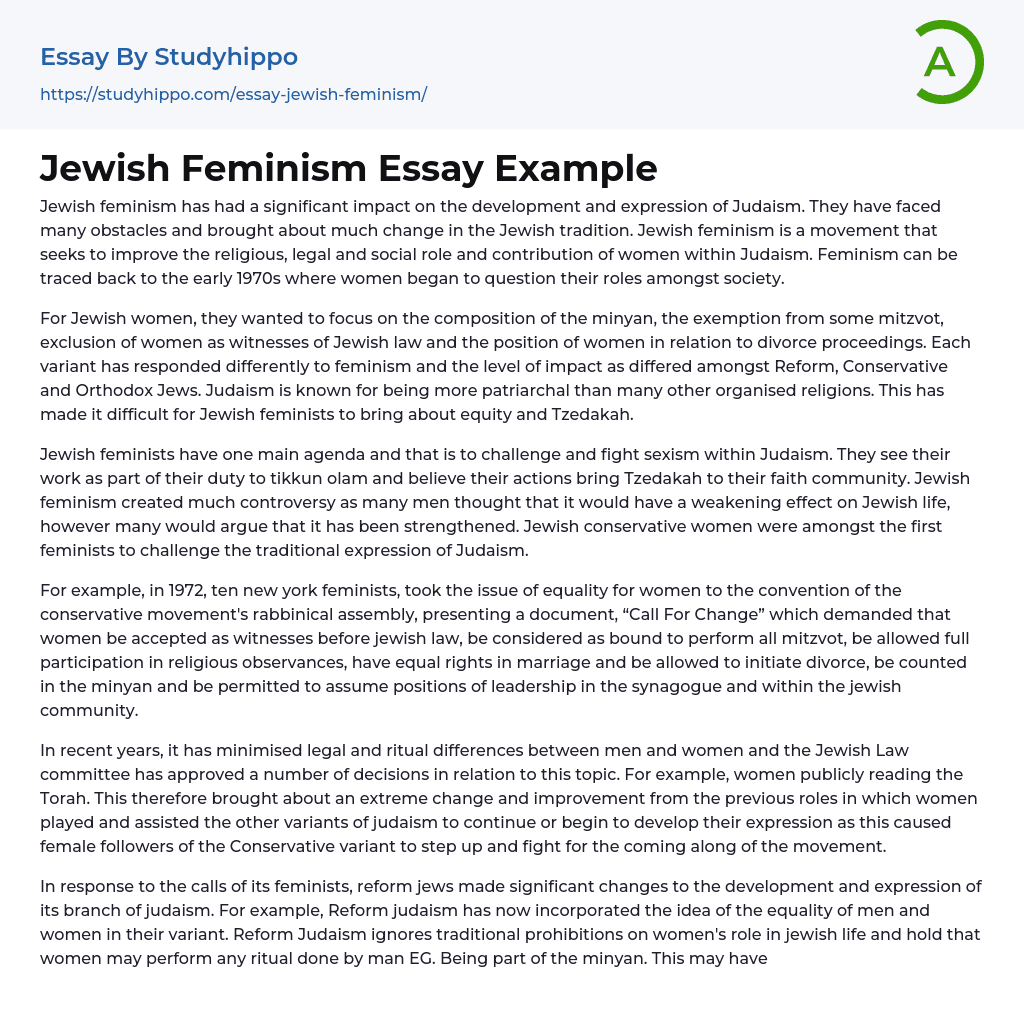The influence of Jewish feminism on the growth and expression of Judaism is incredible. Women in this movement have encountered challenges and made significant alterations to the Jewish tradition. Jewish feminism aims to enhance the religious, legal, and social standing and contributions of women in Judaism. This feminist movement emerged in the 1970s when women began challenging their societal roles.
Jewish women encounter a range of challenges including the organization of the minyan, exemption from specific mitzvot, exclusion as witnesses in Jewish law, and their involvement in divorce cases. The effect of feminism varies among Reform, Conservative, and Orthodox Jews. Judaism is well-known for its patriarchal character, which creates obstacles for Jewish feminists who seek equality and Tzedakah.
Jewish feminists are focused on challenging and combating sexism within Judaism. They believe their
...activism aligns with their duty to tikkun olam and brings Tzedakah to their faith community. While Jewish feminism sparked controversy and concerns about weakening Jewish life, others argue that it has actually bolstered it. Notably, Jewish conservative women were among the initial feminists who challenged the conventional practice of Judaism.
In 1972, ten New York feminists took the issue of gender equality to the conservative movement's rabbinical assembly. They presented a document named "Call For Change" that requested several rights for women within Jewish law. These rights encompassed being recognized as witnesses, having religious commandments apply to them, participating fully in religious practices, enjoying equal marriage and divorce rights, being part of the minyan (prayer quorum), and holding leadership positions in synagogues and the Jewish community.
The Jewish Law committee has made progress in reducing legal and
ritual inequalities between men and women. One of the approved decisions is allowing women to publicly read the Torah. This change has improved the role of women and allowed other forms of Judaism to thrive. As a result, female followers of Conservative Judaism have become advocates for progress within the movement.
In response to feminist demands, Reform Judaism has made significant changes to its development and expression. They have incorporated the concept of gender equality in their practices, disregarding traditional restrictions on women's roles in Jewish life. According to Reform Judaism, women are allowed to participate in any ritual that men can, including being part of the minyan. These changes may have been influenced by the "Call for Change" introduced by Conservative feminists, as well as other Jewish feminists who have had a significant impact on the current expression of Jewish traditions.
Jewish feminism has greatly influenced Orthodox Jewish communities in how they understand and practice their religion, particularly regarding the halakah. The goal of Orthodox feminism is to enhance the position of women within Jewish law, life, and leadership. Instead of seeking total equality or questioning religious customs, it acknowledges that certain adjustments may be suitable for both genders.
The Jewish communities are requesting backing to improve the halakhic status of women. This includes the adoption of new supplementary traditions, prayers, and customs. They argue that women are redefining interpretations of the Halakah, aiming for equal rights not only for spiritual purposes but also to secure respect and recognition for their gradually diminishing significance.
Jewish feminists believe that the ultimate beliefs and importance of Judaism are gradually being diminished and
that the rituals and interpretations are deteriorating. This has various impacts on the development and expression of Judaism, as well as on the different forms and variants of the Jewish religion. Therefore, both positive and negative effects of Jewish feminism can be observed and it is influencing the diverse forms of Judaism.
- Women's Suffrage essays
- Women'S Rights essays
- Women Empowerment essays
- Sojourner Truth essays
- Torah essays
- Abortion essays
- Abuse essays
- Animal Rights essays
- Animal Testing essays
- Assault essays
- Bullying essays
- Controversial Issue essays
- Crash essays
- Cyber Bullying essays
- Feminism essays
- Human Rights essays
- Immigration essays
- Inequality essays
- Poverty essays
- Prejudice essays
- Racism essays
- Torture essays
- Violence essays
- Afterlife essays
- Atheism essays
- Bible essays
- Buddhism essays
- Christian Worldview essays
- Christianity essays
- Confession essays
- Cosmological Argument essays
- Deism essays
- Devil essays
- Existence of God essays
- Faith essays
- Freedom Of Religion essays
- God essays
- Hinduism essays
- Immortality essays
- Islam essays
- Jainism essays
- Jews essays
- Judaism essays
- Miracle essays
- Monk essays
- Monotheism essays
- New Testament essays
- Old Testament essays
- Pilgrimage essays
- Puritans essays




